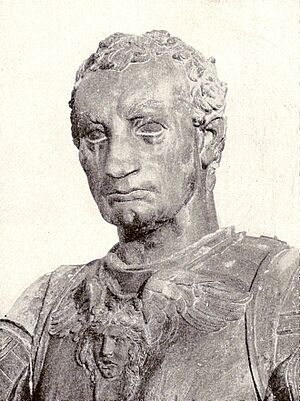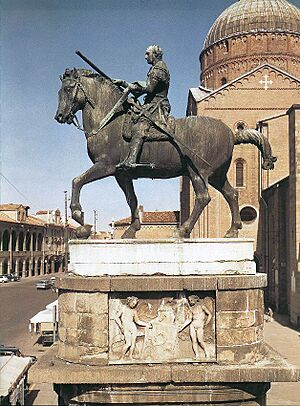Erasmo of Narni facts for kids
Quick facts for kids
Gattamelata
|
|
|---|---|

Detail of Donatello's equestrian statue of Gattamelata
|
|
| Born |
Erasmo da Narni
1370 Narni, Umbria, Papal States
|
| Died | 16 January 1443 (aged 72–73) |
| Occupation | Condottiero |
| Children | Polissena |
Erasmo Stefano of Narni (born 1370, died 1443) was a famous Italian military leader during the Renaissance period. He was better known by his nickname, Gattamelata, which means "Honeyed Cat."
Gattamelata was born in Narni, a town in Italy. He worked for several powerful Italian city-states. He started his career with a leader named Braccio da Montone. Later, he fought for the Papal States and Florence. In 1434, he joined the Republic of Venice to fight against the Visconti of Milan.
One of the most famous things about Gattamelata is the large bronze statue made of him by the artist Donatello. This statue shows him riding a horse and is located in the main square of Padua. Gattamelata also became the chief magistrate (or podestà) of Padua in 1437.
In his hometown of Narni, there is a farmhouse where he was born. It has a special plaque that says, "Narnia me genuit Gattamelata fui." This means, "I was born in Narni, I was Gattamelata."
Contents
Who Was Gattamelata?
Erasmo of Narni was born into a family that wasn't rich. Because of this, he chose a military life. He started working for a lord named Cecchino Broglia. Later, he joined his friend Brandolino Brandolini to serve under Braccio da Montone. Braccio was one of the most important condottieri (military leaders who led armies for hire) in the 1400s.
Early Military Career
With Braccio, Gattamelata helped conquer several towns like Todi, Rieti, Narni, Terni, and Spoleto. In 1419, he fought in a battle against another famous leader, Muzio Attendolo.
In 1424, Braccio's army was defeated in a big battle near L'Aquila, and Braccio himself was killed. After this, Erasmo took the remaining soldiers and offered their services to the Republic of Florence.
Serving the Pope and Venice
In 1427, Pope Martin V hired Gattamelata. The Pope wanted him to get back lands that Braccio da Montone had taken. Gattamelata captured Città di Castello in 1428. He then moved north to stop rebellions in cities like Imola, Forlì, and Bologna. In 1431, he entered Bologna as the main general for the Papal States. He also stopped a rebellion in Forlì.
Around 1434, Gattamelata left the Pope's service because he wasn't getting paid on time. He was then hired by the powerful Republic of Venice.
Battles with Milan
During the war against Filippo Maria Visconti of Milan, Gattamelata defended Bologna. He fought against a general named Niccolò Piccinino. Piccinino defeated Gattamelata in a battle in 1434, where Gattamelata was wounded.
After many fights and clever moves, Gattamelata successfully defended the cities of Brescia and Verona in 1438. For this success, he was given the important title of General Commander of the Venetian armies.
However, the next year, the Venetians lost many cities, including Legnago and Soave, and even Verona. This led to a lot of criticism against Gattamelata. The Venetian Republic then asked another strong leader, Francesco Sforza, to fight alongside Gattamelata. Together, they managed to get Verona back on July 9, 1439.
Later Life and Death
In 1440, while preparing a fleet of boats on Lake Garda, Gattamelata suffered a stroke. He never fully recovered from this illness. He could no longer lead large military campaigns. Gattamelata passed away in Padua in 1443.
Gattamelata's Family
Erasmo Gattamelata had a daughter named Polissena Romagnola. She married Tiberto Brandolini, who was the son of Gattamelata's good friend, Brandolino Brandolini.
Polissena and Tiberto had two sons, Sigismondo and Leonello. This means that the counts of Brandolini d'Adda are believed to be the only known descendants of Erasmo of Narni.
Sigismondo, Gattamelata's grandson, married Antonia in 1458. She was the daughter of Annibale Bentivoglio, a very important person. Sigismondo's second marriage was to Margherita Scotti, which showed how important he had become.
 | Leon Lynch |
 | Milton P. Webster |
 | Ferdinand Smith |


